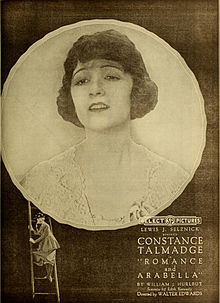William James Hurlbut (1878 or July 13, 1883 – May 4, 1957)[1] was a playwright, screenwriter, and artist.[2][3]
He was the grandson of Stephen Augustus Hurlbut. His father served as mayor of Belvidere, Illinois and invented an "instantaneous camera".[citation needed] William Hurlbut was involved in local theater productions and graduated from Belvidere High School.[4] He traveled with his family to New York with a stop in Peru while the Panama Canal was being constructed.[4] In 1896 he was listed as a student at Washington University's School of Fine Arts.[5]

His plays had female leads.[4] One of his plays was about tenement life. Another was about a girlfriend from Europe coming to a town in America.[4]
He was sued for making alterations and subletting a New York City apartment.[6] He never married and had no children.[4]
Theater
edit- The Fighting Hope (1908),[7] produced by David Belasco
- The Writing on the Wall (1909), produced by Olga Nethersole[8][9]
- New York (1910)[4]
- The Strange Woman (1914)[10]
- Saturday to Monday (1917)[11]
- Bride of the Lamb (1926)[12]
- Engaged; A Farcical Comedy in Three Acts (1926)[13]
- On the Stars (1931)[14]
- Recessional (1931)[15]
- Lover for Two (1936), co-wrote[16]
- Trimmed in Scarlet
- Half a Husband; A Comedy in Four Acts[17]
- "Very Rich,";A Group Portrait Comedy[18]
- Lady Bridget
- A Lincolnshire Idyll[1]
- Lillies of the Field
Films
edit- The Fighting Hope (1915) based on his play
- The Dawn of Freedom (1916)
- The Writing in the Wall (1916)[19]
- The Strange Woman (1918)[20]
- Romance and Arabella (1919)
- Lillies on the Field (1924), based on his play
- The French Lady (1924)
- Lillies of the Field (1930), based on his play
- Good Sport (1931), screenplay
- Imitation of Life (1934 film) (1934), screenplay based on 1933 novel by Fannie Hurst
- Bride of Frankenstein (1935), co-wrote screenplay
- Adam Had Four Sons (1940), co-wrote screenplay adaptation of Charles Bonner's novel Legacy[21]
References
edit- ^ a b "Hurlbut, William J. (William James), 1883-1957 - Social Networks and Archival Context". snaccooperative.org.
- ^ "William J. Hurlbut (Writer) | Playbill".
- ^ "The Cosmopolitan". Schlicht & Field. September 17, 1902 – via Google Books.
- ^ a b c d e f https://www.rhsil.org/uploads/2/6/4/3/26435469/2012_-_vol_50_-_no_1.pdf
- ^ A Catalogue of the Officers and Students of Washington University, for the Academic Year. The University. 1896.
- ^ "Supreme Court Appellate Division" – via Google Books.
- ^ Hurlbut, William James (1908). The Fighting Hope: A Play in Three Acts.
- ^ "OLGA NETHERSOLE APPEARS.; Produces "The Writing on the Wall," a New Play by Wm. J. Hurlbut". The New York Times. January 12, 1909.
- ^ "OLGA NETHERSOLE TO SAIL.; Coming to New York to Rehearse a New Play by W.J. Hurlburt". The New York Times. November 15, 1908.
- ^ The Strange Woman. Syndicate Publishing Company. 1914.
- ^ Hurlbut, William James (1917). "Saturday to Monday.".
- ^ Hurlbut, William James (September 17, 1926). "Bride of the Lamb". Boni and Liveright – via Google Books.
- ^ Hurlbut, William James (1926). Engaged: A Farcical Comedy in Three Acts.
- ^ On the Stairs: A Mystery Play in Three Acts. S. French. 1931.
- ^ Recessional. S. Rose. 1931.
- ^ Hurlbut, William James; MacGregor, Edgar J. (1936). Lover for Two: A Comedy with Music.
- ^ Hurlbut, William James. Half a Husband: A Comedy in Four Acts.
- ^ Hurlbut, William James. "Very Rich,": A Group Portrait; a Comedy.
- ^ "William J. Hurlbut". tcm.com.
- ^ "AFI|Catalog".
- ^ Hurlbut, William James; Blankfort, Michael (1940). Legacy: Screenplay.